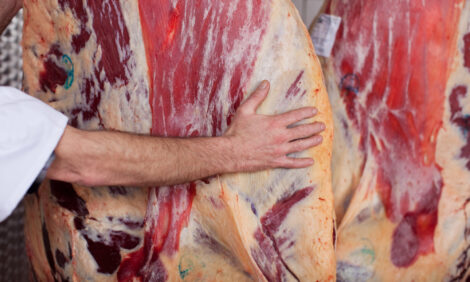



Hopes for Farm Deal at Bali Trade Talks
GLOBAL - Hopes are running high that a deal in selected agricultural issues will come through at the World Trade Organisation December Bali Ministerial Conference.However, chairperson John Adank told agriculture negotiators on last week that there are still remains some hard work to be done on several issues.
The chairperson, who is New Zealand’s ambassador, was reporting to the entire membership on the consultations he and Director-General Roberto Azevêdo have held with a number of delegations since September, and particularly his own consultations since ambassadors last met as the Trade Negotiations Committee on 30 September.
“The priority now is to capture in a more concrete way the convergence that I have described earlier, but also not shy away from highlighting the key areas of divergence that we also have to bridge,” he concluded at the end of the meeting.
“Given the limited time left, I urge all of you to approach the discussions in coming days, in the next couple of weeks constructively and to recognise that we now have extremely limited time if we are to deliver agreed agriculture elements for Bali.”
The focus of the discussions is what might be agreed for the 3–6 December 2013 WTO Ministerial Conference in Bali and what would be undertaken afterwards. Three issues have been identified as possible candidates out of a considerably broader package on agriculture in the Doha Round talks.
The chairperson observed that members still want a deal on tariff-rate quota (TRQ) administration — adapting the way quotas are shared out to reduce the chances that the allocation method is itself a trade barrier — even though the focus more recently has been on the two other issues: stock holding for food security in developing countries, and export subsidies in various forms.
The only other speaker in the meeting was the Philippines, representing the G–33, which broadly confirmed the chairperson’s assessment and stressed the importance of the group’s proposal. The G–33 group of developing countries is seeking extra flexibility for these countries in implementing the results of the agriculture negotiations.
G–33 proposal
In his statement to the agriculture talks, Ambassador Adank outlined eight “elements” under discussion on the G–33 group of developing countries’ proposal on stockholding-for-food-security.
At this stage, members do not envisage changing the rules of the WTO Agriculture Agreement. Instead, they are focusing on a shorter term way of allowing developing countries some leeway to exceed their agreed domestic support limits when they buy, stock and supply cereals and other food in order to boost food security among the poor.
The Bali deal could take the form of a temporary “waiver” (formal legal exemption) allowing countries to exceed their limits, a non-binding political statement by the conference’s chairperson, or some other option in between.
Flexibility along these lines has sometimes been called a “peace clause” or “due restraint”, because members would avoid bringing legal disputes against developing countries in these circumstances.
Ambassador Adank said there is “no convergence” on which of the options members could accept.
But, he went on, that would also depend on the other conditions, such as how long the provision would last, what products — or staple foods — it could cover, what safeguards would be available to prevent the release of the stocks from affecting international markets, and how countries using the provisions would provide enough information to make their actions transparent — one of the “elements” that has seen “the most convergent and detailed focused discussion so far,” according to the chairperson.
“Many members have recognised that by discussing in some details, transparency requirements, conditionality and safeguards, members had already taken steps towards elaborating quite specific requirements on which the flexibility will be dependent,” he said.
“This, it is fair to say, seems to point to a more ‘legalistic’ approach closer to a waiver or another form of ministerial decision than the other two options I have mentioned.”
On stockholding, the G–33 proposes amending the Agriculture Agreement to loosen disciplines on domestic support, including using price support for public stockholding and food aid purposes, in order to enhance food security by supporting poor farmers and consumers. It draws on the text in Annex B of the December 2008 draft “modalities”, the main agriculture draft currently on the table.
Export Subsidies
On export subsidies and related issues bundled under the heading “export competition,” Ambassador Adank also reported some convergence although “a number of issues remain far from agreed”.
His “preliminary” list of topics emerging from consultations with members includes a possible ministerial message from Bali that members consider all forms of export subsidy to seriously distorts trade and that they agree it should be eliminated completely.
Ministers could also recognize that export subsidies have been used less in recent years, although some members have reservations on this for a number of reasons. They could pledge to work actively after Bali towards eliminating the subsidies, and to improve information sharing on export subsidies.
The discussion focuses on a proposal circulated in May by the G–20 group of developing countries active in agriculture. It envisaged first steps towards eliminating export subsidies and disciplining export credit to reduce the chance that the credit is subsidised.
The chairperson’s list of possible topics does not include the group’s original proposals for immediate reductions in export subsidy limits. A number of members have said they would not agree to this without agreement on other parts of the broader agriculture negotiations.
The original proposal arises partly from 2013 deadline for eliminating all forms of export subsidies originally agreed at the Hong Kong Ministerial Conference in 2005, which is symbolic for many members.
Tariff Quota Administration
The chairperson said fewer issues remain to be resolved on the G–20’s proposal on how tariff quotas — sometimes called tariff rate quotas (TRQs), where import duties are lower on quantities imported within the quotas than on quantities outside — are shared out.
The proposal has two components: improving the information shared is less controversial, but how the disciplines might be tightened and particularly what special treatment should be given to developing countries remain more problematic.
Some countries argue that the way the quotas are managed (including the methods for allocating the quotas to importers or exporters, and various other administrative practices), can be too cumbersome and hamper exporters’ ability to access markets.
“In general, my sense remains that members would like to see an outcome delivered in this area for Bali,” he said.
TheCattleSite News Desk


